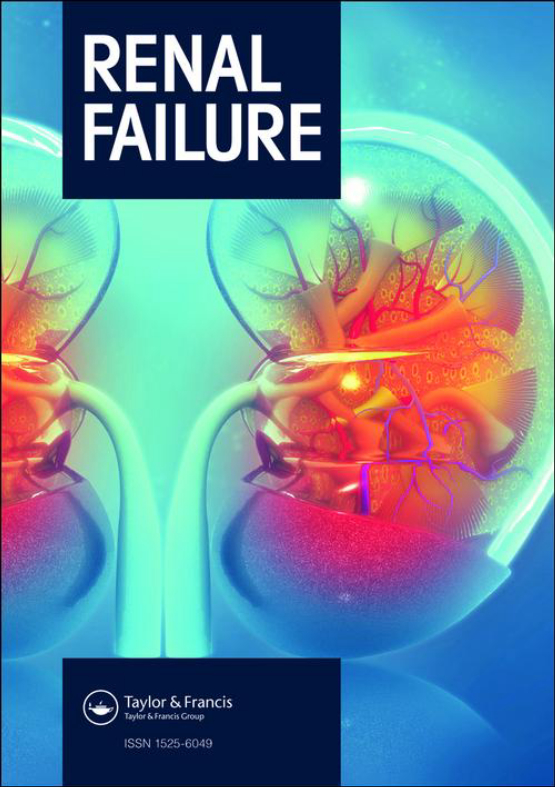Submit a Manuscript to the Journal
Renal Failure
For an Article Collection on
Empowering Nephrology and Transplantation: Innovations in AI, Chatbot, Telemedicine, and Machine Learning
Manuscript deadline
31 July 2024


Article collection guest advisor(s)
Prof. Wisit Cheungpasitporn,
Mayo Clinic, Rochester, Minnesota
Prof. Charat Thongprayoon,
Mayo Clinic, Rochester, Minnesota
Empowering Nephrology and Transplantation: Innovations in AI, Chatbot, Telemedicine, and Machine Learning
Advancements in technology have revolutionized the field of nephrology and transplantation, offering unprecedented opportunities to improve patient care and outcomes. This Article Collection seeks to explore the transformative impact of artificial intelligence (AI), chatbot technologies, telemedicine, and machine learning in the realm of nephrology and transplantation.
The importance of this topic lies in its potential to address critical challenges faced by nephrologists and transplant specialists. With the rising prevalence of kidney diseases and organ transplantations, healthcare professionals are in need of innovative tools and techniques to optimize diagnosis, treatment, and post-transplant management. Integrating AI, chatbots, telemedicine, and machine learning into nephrology and transplantation can significantly enhance clinical decision-making, enable remote patient monitoring, streamline workflows, and ultimately, lead to better patient outcomes.
This collection aims to delve into various aspects of AI, chatbot technologies, telemedicine, and machine learning as applied to nephrology and transplantation. Topics of interest include but are not limited to:
- AI-driven predictive models for early detection and risk assessment of kidney diseases.
- Virtual assistants and chatbots for personalized patient education and engagement.
- Telemedicine applications for remote consultation, monitoring, and follow-up care for kidney transplant recipients.
- Machine learning approaches to optimize organ allocation and increase transplant success rates.
- Ethical and regulatory considerations in implementing AI and telemedicine in nephrology practice.
- Explainable AI in nephrology and transplantation decision-making: Ensuring transparency and trust in AI-driven clinical insights.
- AI-enhanced drug discovery for kidney diseases: Identifying novel therapeutic targets and optimizing treatment options.
- Chatbot-assisted patient monitoring for improved adherence to post-transplant medication regimens.
- Telehealth and remote patient management in peritoneal dialysis: Enhancing patient convenience and reducing hospital visits.
- Machine learning for predicting graft rejection and outcomes in kidney transplant recipients.
- AI-powered image analysis in nephrology: Automated assessment of renal histopathology and radiology.
- Chatbot-supported pre-transplant patient counseling: Addressing concerns and improving transplant readiness.
- Telemedicine-based home hemodialysis: Overcoming barriers to accessibility and improving patient outcomes.
- Machine learning in predicting long-term complications and comorbidities after kidney transplantation.
- AI-driven optimization of immunosuppressive therapy for transplant recipients: Balancing efficacy and side effects.
- Chatbot-guided living donor evaluation and selection: Streamlining the assessment process and ensuring donor safety.
- Telemedicine applications in pediatric nephrology: Remote care for children with kidney diseases.
- Machine learning for identifying potential living kidney donors among incompatible pairs.
- AI-powered patient triaging in nephrology clinics: Efficient resource allocation and prioritization.
- Chatbot-assisted patient-reported outcomes: Capturing real-time data for personalized treatment plans.
We welcome original research articles, systematic reviews, case studies, and opinion pieces that shed light on the advancements and challenges in these areas. By fostering collaboration between researchers, clinicians, and technologists, this collection aims to pave the way for a new era of empowered nephrology and transplantation care.
Keywords: Nephrology, Transplantation, AI, Chatbot, Telemedicine, Machine Learning
Guest Advisors
Wisit Cheungpasitporn, MD is a distinguished Nephrologist at Mayo Clinic hospital in Rochester, Minnesota, known for his expertise in kidney-related disorders and groundbreaking work in artificial intelligence and machine learning in nephrology. He has embraced advanced technologies to enhance patient care, utilizing AI and machine learning to optimize treatment strategies and provide personalized care for conditions like acute kidney failure and chronic kidney disease. His dedication to integrating AI into nephrology has earned him widespread recognition, invitations to speak at prestigious conferences, and collaborations with researchers worldwide, solidifying his status as a thought leader in the application of technology to kidney healthcare. Dr. Cheungpasitporn's pioneering efforts have revolutionized nephrology, driving progress in more efficient, data-driven approaches to kidney disease management, all while upholding a patient-centered approach to innovation.
Charat Thongprayoon, MD, MS is a dedicated clinician and researcher with a focus on kidney diseases, kidney stones, acute kidney injury, and electrolyte disorders. His research has resulted in over 100 peer-reviewed articles and book chapters. He is deeply committed to enhancing patient care in the field of nephrology, especially by artificial intelligence and machine learning.
Disclosure Statement: Prof. Cheungpasitporn and Prof. Thongprayoon declare there is no conflict of interest.
All manuscripts submitted to this Article Collection will undergo a full peer-review; the Guest Advisor for this Collection will not be handling the manuscripts (unless they are an Editorial Board member).
Please review the journal scope and author submission instructions prior to submitting a manuscript.
The deadline for submitting manuscripts is July 31st, 2024.
Please contact Ruby Ru at [email protected] with any queries and discount codes regarding this Article Collection.
To submit your papers to this Article Collection, please:
- Check "yes" for the question, "Are you submitting your paper for a specific special issue or article collection?"
- Select the relevant Article Collection from the drop-down menu under the question, "Special Issue or Article Collection Name."
Benefits of publishing open access within Taylor & Francis
Global marketing and publicity, ensuring your research reaches the people you want it to.
Article Collections bring together the latest research on hot topics from influential researchers across the globe.
Rigorous peer review for every open access article.
Rapid online publication allowing you to share your work quickly.
Looking to Publish your Research?
Find out how to publish your research open access with Taylor & Francis Group.
Choose open accessSubmission Instructions
All manuscripts submitted to this Article Collection will undergo desk assessment and peer-review as part of our standard editorial process. Guest Advisors for this collection will not be involved in peer-reviewing manuscripts unless they are an existing member of the Editorial Board. Please review the journal Aims and Scope and author submission instructions prior to submitting a manuscript.